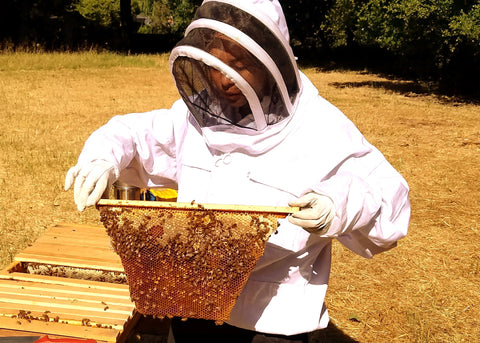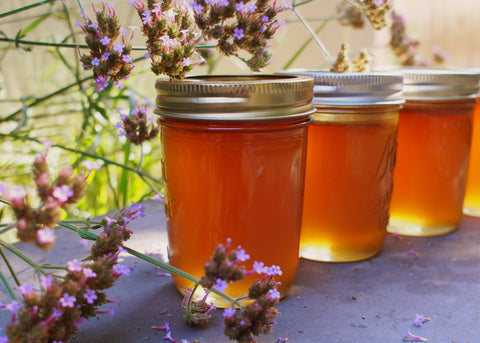Four Ways To Love Your Bees

The humble bee has defied classic aerodynamics, baffling scientists with the “paradox of the bumblebee” for generations. Technically speaking the bee should not be able to fly – it’s designed all wrong.
Yet despite its supernatural ability to fly against all odds, the bee has been nearly grounded in recent years by humanity’s disregard.
Whether we know it or not, humans have essentially declared war on our native bees. Sadly, humans are, so far, winning and bees are perishing in alarming numbers. Habitat destruction, overdevelopment, and shrinking plant diversity all have harmed our native bee populations.
A few years ago, the plight of native bees inspired me and my daughter to take up beekeeping. Truthfully, I was always afraid of bees. I worried they would sting me. I never dreamed I would aspire to actually keep bees, but when I watched the documentary Vanishing of the Bees by Maryam Henein, I was inspired to join the Mt. Diablo Beekeepers Association near my home in California and get involved.
Next, I purchased a top-bar hive online and then contacted a local beekeeper who was selling a swarm he had captured. Suddenly, I was a beekeeper.
Though I’m still a beginner, with several colonies lost and more colonies found, my beekeeping journey continues fueled with love of bees and passion for learning how humans can be part of the solution when it comes to turning the tides in their favor for our mutual future.
Whether you’re ready to keep your own bees or simply seek to keep bees alive on our planet, here are my top five suggestions for joining the movement to save native bees from extinction.
Support Your Local Beekeeper
Bees are good fun for backyard beekeepers, but when it comes to making big change in reversing dramatic bee die off, we’ll need to support our beekeepers who are making bees their business. Beekeeping is the ultimate mission-based business!
Find and buy local honey at your farmer’s market. Or contact your local beekeeping club and find out who near you is selling their honey. Money makes the world go round and the same is true for bees. Bees make the world go round when it comes to pollinating what we eat.
So buy local honey and invest in the future of native bees.
Plant Flowering Natives
Bees love nectar and pollen, right? Try to find flowering plants for your yard that will produce blooms from the earliest part of spring to the later part of fall. Even if you don't have a yard, you can easily grow flowering plants in a window planter box or in pots on a small patio. Some easy plants to grow are marigolds, cosmos, and zinnias.
Flowering plants are great, but native are the best for bees and other beneficial insects like ladybugs. Your local bees have adapted to the plants that are native to your area over thousands of years, and natives are the best "food" for them. We have more than 4,000 bee species in North America (some 20,000 worldwide) ranging from two millimeters to an inch (2.5 centimeters) long, so blossoms should vary in species and size, too.
Get Inspired & Bee Schooled
Knowledge is power when it comes to saving our bees. Read "Quest for a Superbee" in National Geographic magazine and view online documentaries, like Vanishing of the Bees.
Attend a local beekeeping club meeting to learn more about bees in your area and how to get involved in protecting them.
Learn more about organizations that support pollinators and their habitats, such as the Great Sunflower Project, which is a citizen science organization, and the Honey Bee Health Coalition, which is a non-profit educational and policy organization.

Bye, Bye Pesticides. Hello Organics!
This much should be obvious, right? Chemical pesticides, particularly broad-spectrum pesticides, can negatively impact native bee populations. So when you’re at the farmer’s market, buy only organics. It’s a great way to use your dollars to invest in healthy habitats for the bees and yourselves. Humans are best avoiding foods treated with chemicals, so it will come as no surprise that the same holds true for bees. It’s a win-win!
And in your garden, don’t spray pesticides. Use natural remedies for common pests, such as aphids and slugs. Beer, soapy water, cinnamon and other non-toxics can effectively keep pests at bay. Remember, some "natural" pesticides like Neem Oil are actually highly toxic to bees, so read the labels carefully. And don’t forget that companion planting, including plants that naturally repel pests, such as garlic for aphids and basil to support tomatoes, are good strategies.
~Written by Sandra Ann Harris, ECOlunchbox Founder




